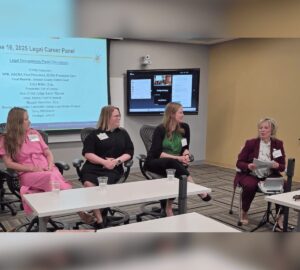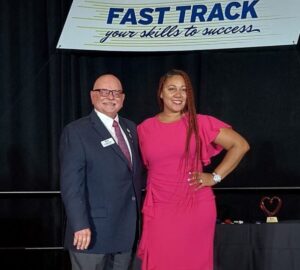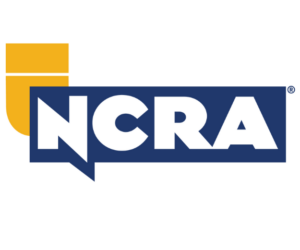
The top three Americans to place in the English as a mother tongue group of the Intersteno Internet Keyboarding Contest, which was held April 11 to May 2, were Sean Wrona, who placed first; Mark Kislingbury, who placed third; and Jelani Nelson, who placed fourth. Wrona’s total word count was 8237 with only seven errors. Kislingbury finished with a total of 8196 words with 20 errors. Nelson ended with 7156 words and seven errors. NCRA’s Intersteno Task Force reached out to ask these three individuals questions about their participation and training.
Cela Askin of Turkey placed second in this category.
Sean Wrona, a captioning assistant from Syracuse, N.Y.
How did you develop your skills at typing/steno?
I taught myself to touch-type when I was about three years old on the old DOS program CPT Personal Touch-Typing. I attained a high speed of 83 wpm (415 cpm) at age six and 108 wpm (540 cpm) at age 10, which was faster than any of the other students or teachers at my elementary school.
What attracted you to competing at this level?
I always knew I could type quickly, but I discovered competitive typing by accident in the spring of 2008 while in grad school. My high school classmate was using the Facebook Typing Speed application, and it appeared in one of his status updates. I did a few 30-second races most days for the next few months and was rather startled to discover that I was consistently 20 wpm (100 cpm) faster than almost all the other users, with the primary exception of Jelani Nelson. Eventually, over the next year and a half, I started receiving private messages from people in the established competitive typing community inviting me to other sites.
Is this something that you do for fun, or is it useful in your work?
There are few jobs in the United States for which typing is the most important aspect to the job. Almost all typing jobs in the United States would rather you have great phone skills and mediocre typing skills than the other way around. While there are some data-entry jobs that just involve typing, they are fading fast and usually do not pay well. It can be useful in my recreational projects, but it isn’t very useful in most jobs here, as almost always other aspects of the job will be more important. It can help you to write quickly enough so you can keep up with your thoughts and not lose your train of thought when you are writing something, but that’s about it.
How did you hear about the Intersteno Internet Competition? How many years have you competed in this competition?
The Intersteno contest was frequently discussed on the forums of the competitive typing website Typing Zone, particularly by earlier champion Yifei “Dan” Chen, who I largely credit with introducing me to the game. He also helped me set up the Microsoft Keyboard Layout Creator so that I could more easily type the accented characters that are not used in English.
What made you decide to participate?
While I was underemployed/unemployed for much of 2009 and 2010, I had a lot of time on my hands, so when I discovered how unusual my typing talent was, I began visiting pretty much all the competitive typing websites I could find and setting records on most of them, although I am much less obsessed today.
What keyboard did you use?
In most years I used a Das Keyboard after winning one in the Ultimate Typing Championship. However, the Das wore out somewhat this year, and I bought a cheaper Logitech this particular year, but almost all other years, I used a Das.
Did you notice anything that was specifically challenging during the testing time?
I have done so many typing tests at this point that they have become second nature, and endurance typing suits me because I lose a lot less speed than most other typists as the length of a text increases. I find typing over very short intervals in an attempt to set peak speed records to be much more stressful than casually typing at a steady rate of speed over a ten-minute period as in Intersteno.
Were you happy with your result?
Yes.
Mark Kislingbury, RDR, CRR, a court reporter from Houston, Texas
How did you develop your skills at typing/steno?
I worked from the beginning of my career on building a strong, realtime-ready dictionary. For much of my career I have shortened my writing by inventing/adopting briefs for words and phrases. By competing in speed contests and world-record events, I have pushed my speed, continually trying to improve.
What attracted you to competing at this level?
I was invited by NCRA to compete in the Intersteno Internet competition, which I didn’t realize existed. It was a very good experience and applying this skill in a way I have never done before: trying to replicate written text exactly.
Is this something that you do for fun, or is it useful in your work?
For me it was for fun and personal growth.
What made you decide to participate?
It seemed fun and interesting to be put into competition with people who use regular computer keyboards. Seems that we could call this MKA, or mixed keyboard arts.
What keyboard did you use?
I used what Intersteno calls a chorded keyboard, which of course is the steno machine keyboard invented by Ward Stone Ireland.
Did you notice anything that was specifically challenging during the testing time?
The software I used to write into the Taki input app would sometimes put an extra space, which would cost errors that I could not prevent.
Were you happy with your result?
Very. I have no doubt that I can improve on my score significantly, with practice.
Any other comments?
Congrats to Sean Wrona for a truly stupendous first-place performance; he is truly the Wizard of Typing and untouched world champion of the computer keyboard. I thank NCRA for inviting me to compete; had they not done so, I would not have even heard about it.
Jelani Nelson, a computer science professor from Cambridge, Mass.
How did you develop your skills at typing?
I started learning piano at 7 and playing video games at 4. That helped finger speed. I then learned proper typing technique starting at age 12, using Mavis Beacon Teaches Typing.
What attracted you to competing at speed typing?
I first started getting into it via the website typera.tk (my username there is Minilek).
Is this something that you do for fun, or is it useful in your work?
I do have to type quite a bit at work (emails, writing up papers, etc.), so it does help with work.
How did you hear about the Intersteno Internet Competition?
From fellow typists at typingzone.com.
What made you decide to participate?
I enjoy competition, and I enjoy opportunities to hone my typing skill.
What keyboard did you use?
Das keyboard.
Did you notice anything that was specifically challenging during the testing time?
Nothing specific.
Were you happy with your result?
Yes.











[…] Jelani Nelson, one of the fastest typist in the world, credits playing piano as a child as one of the main contributing factors to his fast typing speed, in this interview here. […]